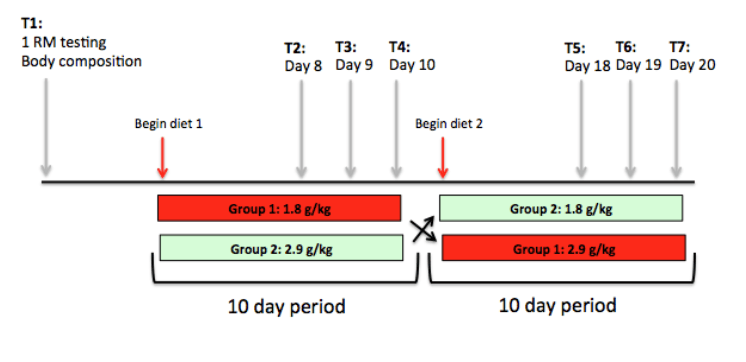How do protein intake and nutrient timing affect your recovery? [Study proposal]
Update: The study has been published. Click here to read it.
Fellow Bayesians, the Bayesian research team is conducting a new study about the effect of protein intake and indirectly nutrient timing on recovery. I’m paying for this and other studies we’re doing out of my own pocket, because it is important to me. This has cost me thousands of dollars. I make a decent living and I live a sober lifestyle: I don’t own a house, car or TV and all of my life belongings fit into 1 large and 1 small suitcase. So I can afford to do this. In fact, I already have paid for the study below. If you want to support us to publish more scientific papers by donating or sharing this page, I would deeply appreciate it.
- – Menno
Note: You need either a credit card or a Paypal account to donate. For bank transfer donations above $20, please email BayesianBodybuilding@Gmail.com
About the upcoming study
Our goal is to improve protein intake recommendations for strength athletes in order to optimize their performance and recovery. Our research question is: Does a protein intake above 1.8 g/kg/d affect the rate of recovery after strength training in resistance-trained subjects?
What is the context of this research?
Previous research has demonstrated that consumption of whey protein around (pre and post) strength training increased muscle growth and strength development during a 10-week period (Cribb and Hayes, 2006).
Hoffman et al. (2010) additionally found that 42 g protein consumed immediately before and after a strength training session improved recovery in strength trainees compared to a maltodextrin placebo. The protein intakes of the groups were 2.0 g/kg/d, excluding the supplements. Since energy intake and nutrient timing were not equated between groups, it is unclear if the faster recovery was the result of increased energy intake, the timing of the protein supplement or the protein intake itself. Since other research has shown no long-term benefits of protein intakes over 2.0 g/kg/d, our study aims to replicate the research of Hoffman et al. (2010) while controlling for the timing of the supplement intake and total macronutrient intake in resistance trained athletes. This will tell us:
- Whether more than 1.8 g/kg/d protein will benefit recovery and thus likely strength development and muscle growth.
- Whether Hoffman et al.’s results were the result of workout nutrient timing or energy intake on the one hand or due to their greater protein intake.
Methods
We recruited 16 resistance trained male and female participants (aged 18-45 years) who had been resistance training for at least 1.5 years and not less than 3 hours per week on average. One subject did not complete the study. The strength inclusion criteria were:
- Bench Press 1RM
- Females: >= 55% body weight
- Males: >= 110% body weight
- Squat 1RM
- Females: >= 100% body weight
- Males: >= 150% body weight
This study employed an experimental, randomized controlled, cross-over design that lasted a total of 20 days. Participants followed a 10-day dietary program composed of matched calories (isocaloric diet) with either 1.8g/kg/d protein intake or 2.9g/kg/d protein intake, with the difference in total protein consumed being the central variable.
On three consecutive days in each 10-day period, subjects performed three sets of each selected exercise (squat, bench, bent over row) at 80% of 1RM. The number of repetitions performed at each lab visit were used for evaluation of performance and recovery. After the first 10-day period, participants ”˜crossed-over’ to the other intervention for another 10 days. The study design is outlined below.

Budget
In order to assess participants’ recovery, we measured the blood recovery markers creatine kinase and TNF-a. Analysis costs for the blood samples totaled £2408 for the analysis of both markers in 14 blood samples (pre- and post-workout) for each subject.
Full Cost Overview
Creatine Kinase
- £1.32 per sample (VAT included)
- Total costs: £293
TNF-alpha
- £9.53 per sample (VAT included)
- Total costs: £2115
Total costs
- All samples: £2408
 Want more content like this?
Want more content like this?
Then get our free mini-course on muscle building, fat loss and strength.
By filling in your details you consent with our privacy policy and the way we handle your personal data.
